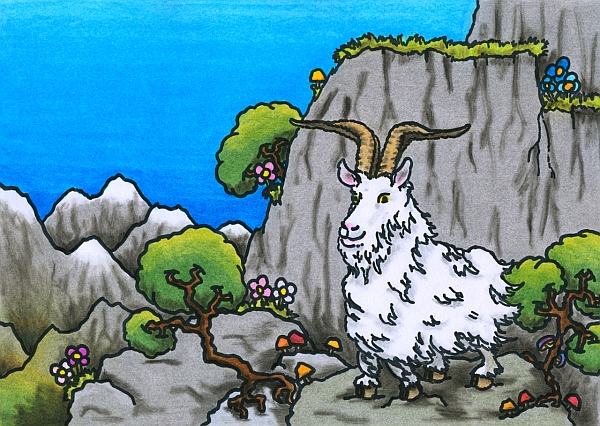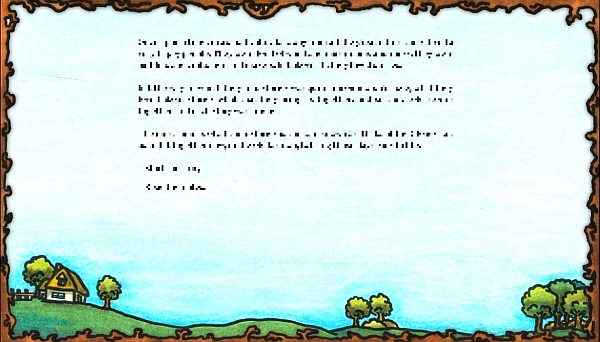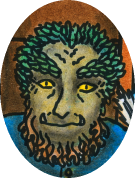As you set out for Ithaka
hope the voyage is a long one,
full of adventure, full of discovery.
– C.P. Cavafy, Ithaka
Whoa, it’s been a long time since our IndieGoGo. Dear God. I don’t even want to think about it. The funny thing is I haven’t stopped working since. I haven’t really taken time off since about 12 years ago, to be honest. We didn’t spend a cent of that money on erotic drugs, illegal massages, or whatever else it is crowdfunded money is supposed to be for. But boy is this taking a long time! And since I have a tendency to want to keep things quiet, to maintain the reality (and the surprises) of the stories, that means people are frequently left in the dark. Which is OK when they haven’t invested money in something, but less so in the case of crowdfunding.
So let me explain, not just as an apology, but also to help others who might find themselves planning something like this.
When we ran our IndieGoGo campaign, I estimated the amount of time it would take to finish Ithaka of the Clouds at 6-8 months. I based this on three things:
1) My health and ability to work.
2) Our financial situation.
3) The lack of other projects.
4) The time it had taken us to make The Sea Will Claim Everything.
Turns out I was wrong about all of this. Making games is always a messy business, more so than any other artform I’ve ever experienced, and when the parameters change on you, suddenly nothing is going where you thought it would.

1) Health
The fewer people there are in your team, the bigger a deal this is. Many indie teams consist only of a handful of people, sometimes even just a single person. And when someone gets sick, your whole plan goes to hell. As some of you may know, I’d experienced a lot of problems with my teeth. Really, really painful problems. But when we were starting the campaign, I thought the worst was behind me. I mean, my dentists were telling me so, and they probably knew what they were talking about, right? Yeah, not so much. Turns out I’ve been cursed with terrible dentists. At one point five different dentists failed to identify a catastrophic infection in one of my teeth.
Finally, one night I started experiencing pains that I cannot even describe to you. I was almost blacking out. It was unbelievable. I’ve never experienced anything even remotely similar. It was the middle of the night and the pain was unbearable, so we checked for dentists open for emergencies – there are only ever very few in Frankfurt – and went to one. She wanted to do a root canal on a tooth, but I looked at the X-rays and felt very uncertain – surely it was the tooth at the back that was the problem? No, she said. I almost had a nervous breakdown trying to decide. In the end, we left. I was in agony.
A few hours later, a different dentist was available. We went there. He looked at my X-rays, said “Any amateur should be able to find this!” and pointed at the tooth at the back. He fixed it with a painless root canal, which none of my other dentists had ever really managed. (When asked about a substance they put in your teeth to kill off the nerves instead of immediately doing a root canal, he said that stuff was “harcore carcinogenic crap from the 70s” that he doesn’t even stock.) And suddenly I had a good dentist. Unfortunately he now had to begin the task of fixing the disaster all the previous dentists had caused. He’ll be done in about… oh, 8-9 months.
And of course this has cost and will continue to cost thousands of euros. I didn’t pay for this from the crowdfunded money, but I still had to pay for it – because the German healthcare system simply doesn’t provide. Teeth – like glasses – are just not considered essential. Because, you know, human beings don’t need to eat. Or see.
My toothy horrors weren’t the only unexpected health problems we had to deal with – there was also our cat’s urinary tract surgery, and family issues you don’t need to be bothered with – but they were the most painful and the most expensive, and they did a lot to derail our progress. Basically, I am now where I thought I was several years ago. Ridiculous, but what the hell can you do? You can’t argue with material reality, as Straton of Stageira pointed out.
2) Finances
As anyone who’s tried can attest to, being an indie developer in Germany is a tricky business. For one thing, the laws are simply out of date. Anything done via the internet doesn’t fit well into the existing categories, which were designed around the time Steam wasn’t in your computer but coming out of your locomotive. And being an artist working with digital media? Don’t even get me started.
I must admit that I wasn’t adequately prepared for this. Verena and I had attended some seminars about being self-employed, but as it turns out, they weren’t that helpful. Once you fall out of the lowest category (which is quite easy), taxes hit you hard. I’m not surprised to have heard a lot of horror stories about German small businesses just collapsing at that point. It’s shockingly difficult. Even if I was a capitalist, I would find this system highly questionable. It may benefit big business, but this seems like a fantastic way to destroy the growth capitalism so desperately needs. Oh well.
With being self-employed also come completely deranged healthcare costs, by the way, which makes the fact that I have to pay for the continual annihilation and reconstruction of my dental capacities myself doubly enraging. I managed to at least get into a special healthcare thingy for artists, but first I had to prove I was an artist. (And now again, to avoid paying taxes that artists shouldn’t need to pay. We’ll see how that turns out.)
What all of this boils down to is a near-infinite amount of paperwork. I mean, you cannot imagine how many weeks I’ve spent just filling out forms, making lists, printing stuff out… it’s mind-boggling and it grinds your progress on actual work down to nothing.
So, if you plan on going indie in Germany, you should probably expect that potentially more than half your budget will be spent on taxes (especially in the first couple of years, when you may end up paying taxes for two years at once), and a significant amount of time will be devoted to paperwork. Even with an accountant! And it’s not like accountants are cheap. Do not underestimate this, because it will hurt. Trust me. I know.
3) Other projects
Along the way, The Talos Principle happened. It was a unique opportunity, the kind you can’t say no to, and the resulting game is something I’m incredibly proud of. It was also a metric ton of work, and I can’t say that didn’t delay Ithaka; but then, it also made things much easier. The Lands of Dream are far stronger now than before, and at least we managed to get all our backers a very serious discount. (And the feedback has been tremendous.)
Of course, there was more work: Road to Gehenna (the upcoming Talos DLC) and A Postcard From Afthonia. For the former the same applies as to the original game, and for the latter, well, it’s a Lands of Dream game, and all backers got the Special Edition for free. It was my first time putting together such extras, but I was very happy with the result, and I’m sure we’ll do even better with the next games. And it was really cool that so many people tried the moussaka recipe and loved it.
4) Design
Designing games is the least predictable artistic process I know. There are so many variables, so many ways of changing things – especially if you’re not starting with the intention of making a particular genre of game, but of telling a story or creating a world. I’ve been doing it for over a decade and I still can’t predict it at all.
(For example, I have a game sitting in my projects folder that has a very unique visual style that I adore, all kinds of great ideas packed into it, but I only figured out how to really make it work a couple of weeks ago. I think I first worked on it before Ithaka. And all it needed was a change in story setting.)
Making a Lands of Dream game is always a process of exploration, but you do go in with at least an idea of your destination. I started working on Ithaka of the Clouds knowing certain specifics: I knew who the characters were, where they started out, where they would end up. I also had several important stylistic choices in mind, because it’s very important to me to give each game its own flavour. Above all, I knew I wanted to evoke the feeling of a forward journey, time passing, things changing.
We made the first third of the game – or at least the first chapter, depending on how you looked at it, which covered the protagonists’ childhood. There was a great deal of fun stuff in there. But as the game continued to evolve, something was off. I struggled to put my finger on it. It just didn’t feel right – the interface, the ways of interacting with the gameworld that the “classic” Lands of Dream style was based on, didn’t allow me to create quite the experience that I wanted. It felt like a stretched-out version of The Sea Will Claim Everything instead of what it was supposed to be.
There was one bit that worked great, though: the wintry bit. We’d been wanting to make a Lands of Dream game set in the snowy north for a while now, and at this point we were thinking it would be a story-in-the-story in Ithaka. But it kept growing, and taking on a personality of its own. Eventually we decided we could release it as a small standalone game, free for backers, like we did with A Postcard From Afthonia. Except… it still kept growing. A single idea basically doubled the size of the game in one fell swoop. And then our beloved and surprisingly patient composer, Chris Christodoulou, started writing music for it, and the music was so impressive, so beautiful and so grand, that I felt the game had to be even bigger than planned. And Chris, inspired by the atmosphere and the lack of constraints, produced even more music! It ended up being as big as The Sea Will Claim Everything, if differently structured.
It’s called The Council of Crows and I love it.
Meanwhile, for a long time now, a strange thing was happening in the back of my mind. I would catch glimpses of a game. It was all about sailing and the ocean – going from port to port, discovering new places, meeting new people, really capturing the feeling of travelling in the Mediterranean. It was text-based, choice-based, a kind of interactive novel. And I yearned for it, I yearned to work on it and make it happen, but I kept telling myself that I was supposed to finish Ithaka first, and anyway this was entirely too similar in what it was evoking, and so on…
Yeah, I can be pretty thick sometimes.
Eventually I realized two important facts:

I. The Council of Crows is Ithaka of the Clouds.
That big game in the classic Lands of Dream style? That’s The Council of Crows. That’s the game we crowdfunded, the game we were imagining. It grew out of that one chapter, and it’s not the exact same story, but it has the same heart. It shares themes, locations, gameplay… and it’s actually turned out to be an utterly essential part of the greater story of the Lands of Dream, much more significant than I ever expected.
And it’s a thousand times better than some half-arsed version of Ithaka would have been.

II. Ithaka of the Clouds is the interactive novel I was dreaming about.
Of course it is. Sailing from island to island, meeting people, discovering new places, making interesting choices – it’s the Odyssey, it’s Ithaka. I should’ve realized straight after making The Matter of the Great Red Dragon, which I enjoyed immensely. Long before games like 80 Days (which is lovely) became successful, I loved game books – in fact, the very first game I ever made as a child was a Choose Your Own Adventure-style game book inspired by Lone Wolf. And, strangely enough, before crowdfunding Ithaka, I’d been thinking about trying to crowdfund a (digital) game going back to those roots.
I’d gotten the setting wrong, but the type of game right.
Suddenly everything made sense again. The game had felt weirdly stretched-out because the structure and gameplay of The Sea Will Claim Everything is all about expanding the map, travelling around an area; Ithaka was about moving forward, which means there should be more choices, more things you might or might not see – and it should feel natural that you can’t go back, which it never did with the previous system.
We did some rough tests (see above), and it just felt right. Oddly enough, the work I did on The Talos Principle: Road to Gehenna (you’ll see) also confirmed that feeling. Working with text (with illustrations by Verena, of course) opens up all kind of awesome possibilities for exploring the Lands of Dream in new ways, and doing so on a scale far larger than The Matter of the Great Red Dragon or my other text adventures is massively exciting.
I mean, what I’m planning is incredibly ambitious. It’ll be an interactive novel like no-one’s seen before. I won’t say it will be the best such work, because that kind of bragging is ugly and pointless, but it will be the best possible version of Ithaka of the Clouds: dense and rich and complex, it will draw you in and make you feel you were right there, you were part of that story.
Consequences
When we ran the crowdfunding campaign, I’m not sure I was aware of just how burned out I was. I wanted to make one more Lands of Dream game, but I wasn’t sure I ever wanted to make another game after that. I’d spent recent years in the very-very-indie part of the indie scene, if you know what I mean, and that space had recently turned horrifyingly toxic. To suddenly find yourself hated and denounced by people you’d considered friends, or at least allies (in the regular sense of the word), simply for being an internationalist and a socialist and not subscribing to a very specific brand of US-centric identity politics… it was depressing, to say the least. Mainly, I think, because it was so viciously personal. I’ve never thought that being wrong about something inherently makes you a bad person, but apparently this belief has taken over large parts of the internet, and it really sucked the joy out of everything.
I struggle with depression anyway, even without that stuff. I try not to talk about it too much, because I’m disturbed by how depression has become romanticized and fetishized, but yeah, it’s something I have to deal with, and between the awful weather and the awful people, I was pretty down. Ithaka, more than anything, felt like a swan song.
The Talos Principle changed that. I still want to spend more time on novels and screenplays and films, but I do still love games. (I’ve never been able to understand this whole “smash X” discourse. I don’t want to smash stuff, I want to improve it. Even socialism, as far as I’m concerned, is about building on the accomplishments of capitalism.) My enthusiasm for the Lands of Dream once again matches the love and loyalty I feel towards that world.
What does that mean for the actual games? It means I want to do things properly.
You see, what’s usually happened so far is that I’d finish a project, burned out and depressed, and I’d only do minimal publicity. I hate publicity anyway – I hate spoiling the game for people, I hate bragging, I hate having to reduce the ineffable of art to a features list… so the games would only ever reach a small fraction of the people they could’ve reached. I’d like to change that, and the only way I can do so is by taking enough time, picking a non-ridiculous release date, and actually getting some help with the whole publicity thing.
There’s more, though. With both The Council of Crows and Ithaka of the Clouds becoming highly significant stories in the greater mosaic of the Lands of Dream, it’s becoming increasingly problematic that some of the older games aren’t available in as accessible a format as I’d like them to be. Particularly The Strange and Somewhat Sinister Tale of the House at Desert Bridge, which started us on this journey, and which remains utterly central to the work as a whole. But even The Sea Will Claim Everything is not in the state it ought to be in, with font problems on newer Windows systems, irritating small mistakes, and design elements that are flawed due to the horrible amount of pressure I was under when it was made.
So this is the new plan:
- My first priority is the updated version of The Sea Will Claim Everything, which will be released on Steam and Humble.
- The standalone version of The Book of Living Magic and the updated version Desert Bridge must be finished sooner rather than later. I already started work on both long ago, but I now intend to put more effort into finishing that work, taking inspiration from the Special Edition of A Postcard From Afthonia. (They’ll be free, but will include cool extras.)
- The Council of Crows will be finished in the coming months, but will not be released to the public immediately, so we can take the time to polish and promote it. However, backers will receive the game as soon as it’s done, even months before it’s released.
- After that, the long process of creating the insanely ambitious new Ithaka of the Clouds will continue.
- While I will consider finishing The Council of Crows as finishing our crowdfunding obligations per se (if under a different title), backers will receive backer rewards for both games. Meaning they will not only receive DRM-free copies of both games, but those who put in more money will have their name in both games, suggest a creature for both games, etc.
So in the end, while it will have taken a long time, backers will have received:
- A Postcard From Afthonia (Special Edition)
- The Council of Crows
- Ithaka of the Clouds
- 50% off The Talos Principle
- early access to the updated The Book of Living Magic and Desert Bridge
- plus the more specific rewards
I don’t know if this is a stupid business decision, but I know how scarce money is these days, and I want every cent you invested in the Lands of Dream to mean something, even if the road is long and there are some unexpected encounters with Laistrygonians and cyclopes.
Love,
Jonas (and Verena and Chris and Cat and Julian and Bob and many others)













